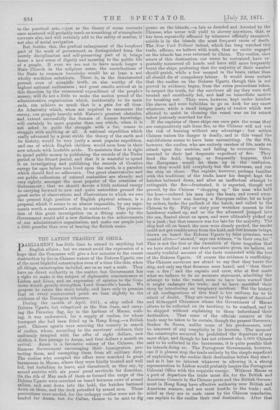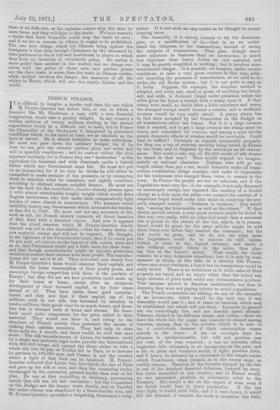THE LATEST TRAGEDY IN CHINA.
pARLIAMENT has little time to attend to anything but English affairs ; but we cannot avoid the expression of a hope that the Commons will give a few minutes to the recent destruction by fire in Chinese waters of the Dolores Ugarte, one of the most frightful catastrophes even of a time like this, when all things, catastrophes included, are on so vast a scale. They have no direct authority in the matter, but Government has a right to make it the subject of diplomatic remonstrance at Lisbon and Lima, and an expression of opinion in the Com- mons would greatly strengthen Lord Granville's hands. We propose to relate the story briefly, and have only to premise that on every controverted point we lean slightly to the .evidence of the European witnesses.
During the month of April, 1871, a ship called the Dolores Ugarte, but rebaptized as the Don Juan, and carry- ing the Peruvian flag, lay in the harbour of Macao, wait- ing, it was understood, for a supply of coolies, for whose transport she had been fitted up in Hong Kong,—a British port. Chinese agents were scouring the country in search of coolies, whom, according to the survivors' evidence, they uniformly tempted with the offer of eight dollars, new clothes, a free passage to Anam, and four dollars a month on arrival. Anam is a favourite colony of the Chinese, the Siamese Government encouraging their immigration, pro- tecting them, and exempting them from all military duty. The coolies who accepted the offers were marched to great barracoons in Macao, where they were kindly treated and well fed, but forbidden to leave, and threatened, as they say, by armed sentries with six years' penal servitude for desertion. On the 4th of May such of them as formed the cargo of the Dolores Ugarte were marched on board between rows of armed sailors, and sent down into the hold, the hatches battened down on them, and the dock patrolled by armed men. These precautions were needed, for the unhappy coolies were not in- tended for Anam, but for Callao, thence to be sent to digi
guano on the islands,-.—a fate so dreaded and detested by the Chinese, who never will yield to slavery anywhere, that, as has been repeatedly affirmed by witnesses officially examined, suicide is in the islands the most frequent cause of death. The New York Tribune indeed, which has long watched this trade, affirms, we believe with truth, that no coolie engaged on the islands has ever returned to China. The coolies, once aware of this destination, can never be restrained, have re- peatedly massacred all hands, and have still more frequently burnt the ships, preferring that the majority of their number• should perish, while a few escaped in the boats rather than all should die of compulsory labour. It would seena certain that the coolies on the Dolores Ugarte, though this is not proved in evidence, began, from the extra precautions taken, to suspect the truth, for the survivors all say they were well treated and excellently fed, and had no immediate motive for breaking out. They were, however, kept under hatches like slaves, and were forbidden to go on deck for any cause whatever, while a small fatigue party of twelve which was allowed to assist in cleaning the vessel was on its return below jealously searched for fire.
If the captains of these ships can once gain the ocean they are comparatively safe from fire, as the Chinese will not run the risk of burning without any advantage ; but within Chinese waters the danger is deadly, and in this vessel the watchfulness seems to have been unremitting. On the 6th, however, the coolies, who are entirely careless of life, made an attack upon the sentries, and failing to overcome them, resorted to their last desperate expedient of fire. They fired the hold, hoping, as frequently happens, that the Europeans would let them up in the confusion, when they would kill everybody but the steersman, and run the ship on shore. The captain, however, perhaps familiar with the traditions of the trade, knew his danger, kept the hatches battened down, and after an ineffectual attempt to extinguish the fire—frustrated, it is reported, though not proved, by the Chinese "chopping up" the man who held the hose—ordered his men into the boats, and rowed away. As the last boat was leaving a European sailor, let us hope by orders, broke the padlock of the hatch, and called to the Chinese to fly. Fifty or sixty poor wretches nearest to the hatchway rushed up, and as the fire advanced jumped into the sea, floated about on spars, and were ultimately picked up by a junk ; but that resource was too late for the majority. The ship had oil on board, the men were closely packed, the smoke could not get readily away from the hold, and 600 human beings, drawn on board the Dolores Ugarte by false promises, were roasted alive—" stewed," says one witness, "in their own fat." This is not the first or the twentieth of these tragedies that we have studied ; and our short narrative gives, we believe, an exactly truthful account of the facts connected with the loss of the Dolores Ugarte. Of course the evidence is conflicting. The Chinese survivors are afraid to say that they burnt the ship, and only say that firearms were heard, and "then there was a fire ;" and the captain and crew, who at first made what we believe to be an accurate statement, admitting the attempt to take the vessel, seem to have been warned that it might endanger the trade, and to have modified their story by introducing an imaginary accident. But the history of all conflagrations of this kind is too uniform for us to admit of doubt, They are caused by the despair of deceived and kidnapped Chinamen whom the Government of Macao allows to be collected on its territory, to be confined, and to be shipped without explaining to them beforehand their destination. That some of the officials connive at the trade may be taken to be certain, though the present Governor, Senhor da Souza, unlike some of his predecessors, may be innocent of any complicity in its horrors. The moment the catastrophe occurred he prohibited the departure of any more ships, and though he has not released the 5,000 Chinese said to be collected in the barracoons, it is quite possible that he intends doing so. The Portuguese Government, however, can if it pleases stop the trade entirely by the simple expedient of explaining to the coolies their destination before they start ; and as it has no interest whatever in allowing it, a strong representation to Lisbon would probably inspire the Portuguese Colonial Office with the requisite energy. Without Macao as a port of departure the trade must die, for the British and American Consuls in the Chinese ports and the British Govern- ment in Hong Kong have effective authority over British and American seamen, and are most hostile to the trade ; and, aided as they are in such cases by the Chinese mandarins, can explain to the coolies their real destination. After that
there is no difficulty, as the captains cannot ship the men by mere force, and they will fight to the death. We have scarcely a doubt that Lord Granville could stop the trade at once ; and if we are to remain in China, it ought to be prohibited. The one true charge which the Chinese bring against the foreigners is that they inveigle Chinamen by the thousand by false pretences to die of toil and heartbreak in places to which they have no intention of voluntarily going. No nation is more guilty than another in the matter, but we charge our- selves with the police of those seas, and neither piracy nor the slave trade is worse than the trade in Chinese coolies, while neither involves the danger, the massacre of all the whites in Macao, which will one day startle Lisbon and the world.































 Previous page
Previous page